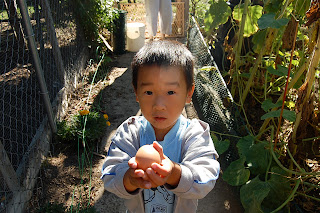How does it happen that a comprehensive, insightful, scientific method of educating each human being to his or her potential, gets brushed under the rug for half a century? I mention this because sometimes when I am presenting Montessori to parents, students and others, someone inevitably asks a question like, "If Montessori is so great, why isn't it everywhere?" My answer is usually short, and includes information like, "Actually Montessori is everywhere, but is usually limited to the private sector - although public schools are experimenting with charters, and some cities, like Milwaukee, WI have chosen Montessori education for their public school model." (As I said, that's the short and sweet answer. The authentic answer is more complex, and more down and dirty.) Then I usually give the questioner a few numbers and some statistics about the people who have attended Montessori schools, and the people who choose Montessori schools for their children. I might say something like, "...Today there are over 17,000 Montessori schools worldwide including thousands of preschools in the USA and hundreds of Montessori schools in the U.S. at the K-8 level" (Petter-Lipstein, 2011, p.488). People who want and can afford a state-of-the-art education for their children often choose Montessori. I also mention Montessori success stories like Jeff Bezos and the Google Boys, because, I have learned that the current generation relates well to that type of information. That's my spiel... I don't go into the details of Dr. Maria Montessori's vast contributions to human society over a lifetime spent excelling, achieving, advocating, struggling, and succeeding in transforming - actually inventing - a scientific approach toward the education of young children. I don't elaborate with details of her trials to obtain her education during a time where women faced overt discrimination, and discuss her fear of the cadaver lab that she had to use a night, as she was not allowed to share the space with men during daytime. I don't bore them with a list of her achievements: Physician, pediatrician, anthropologist, scientist, visionary, suffragette and crusader for women's rights, and children's rights, and the rights of the poor. I don't mention that during its heyday, Montessori education was endorsed by "...Jean Piaget, Erik Erikson, Alexander Graham Bell, Thomas Edison, and Woodrow Wilson, who helped to start Montessori schools in the United States" (Sanantonio, 2011, p.4) I don't tell them that she had enjoyed fame and honor for her achievements, that she was invited and welcomed, and had lectured and taught her method around the globe, only to see her vision of education appear to be dashed, toward the end of her life. In 1952, the year Dr. Montessori died, (and the year I was born,) Montessori schools, that had held such hope, were in serious decline in the United States.

Help me to do it by myself.
Peer teaching, cooperation in a non-competitive atmosphere
Nurturing and care of our environment: People, animals, plants, materials and the Earth
"Not in the service of any political or social creed should the teacher work,
but in the service of the complete human being,
able to exercise in freedom a self-disciplined will and judgement,
unperverted by prejudice and undistorted by fear."
Dr. Maria Montessori
Thank goodness her followers held on. The roots flourished, Montessori schools kept Dr. Montessori's philosophies and principles intact, and now we are seeing a resurgence of interest in this model that meets or exceeds standards that traditional educators have been grappling with since the inception of factory education. We were careful to steer away from criticizing public schools for decades. Instead we persisted in establishing Children's Houses, where children blossomed according to their natural inner drives to learn, to practice and repeat, and to master. We were quietly effective. Things have shifted, and the traditional system of education is said to be "broken." I do not believe that it is "broken," but that it was never an appropriate method to truly lead human beings to
think critically. We have the optimum method right under our noses. As Petter-Lipstein stated, "Superwoman was already here. And she gave us a superb educational model to end "The Race to Nowhere'..."(p.488). Let's clean house, shake out some rugs, give our children and our schools some fresh air. Montessorians: It's time to make some noise.
















